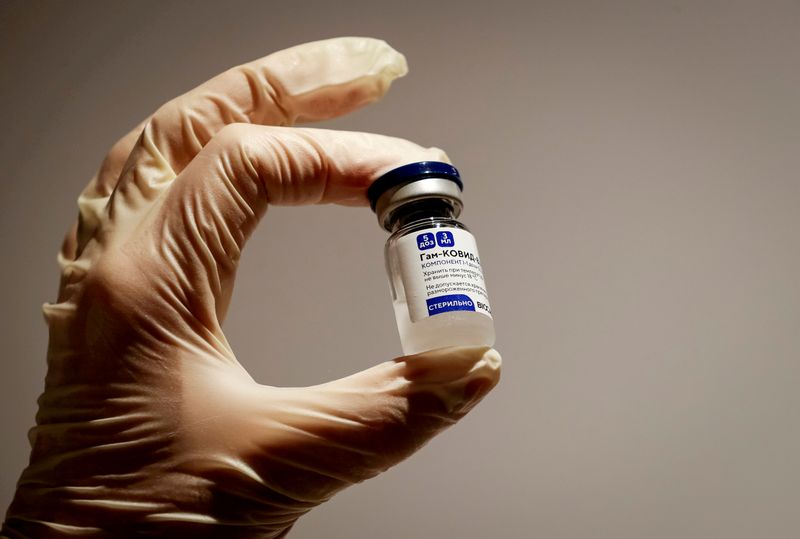
© Reuters. FILE IMAGE: SUBMIT PHOTO: A medical specialist holds a vial of Sputnik V vaccine against the coronavirus in a department store in Moscow, Russia
MOSCOW (Reuters)– A Russian trial checking the effectiveness of revaccination with the Sputnik V shot to safeguard against new mutations of the coronavirus is producing strong results, scientists said on Saturday.
Last month President Vladimir Putin purchased a review by March 15 of Russian-produced vaccines for their efficiency versus brand-new variations spreading out in various parts of the world.
“( A) recent research study carried out by the Gamaleya Centre in Russia revealed that revaccination with Sputnik V vaccine is working very well against brand-new coronavirus anomalies, consisting of the UK and South African strains of coronavirus,” said Denis Logunov, a deputy director of the centre, which developed the Sputnik V shot.
Outcomes of the trial are anticipated to be released soon, but this was the very first indicator of how the tests are going. No further information were available yet.
So-called viral vector shots– such as Sputnik V and a shot established by AstraZeneca (NASDAQ:-RRB— utilize harmless customized infections as cars, or vectors, to carry hereditary details that helps the body construct immunity against future infections.
The revaccination used the very same Sputnik V shot, based upon the exact same adenovirus vectors. The trial showed this did not impact efficiency, Logunov stated in a declaration to Reuters.
Some scientists have actually raised the possible danger that the body also develops resistance to the vector itself, identifying it as an intruder and trying to ruin it.
However designers of Sputnik V disagreed this would present long-term issues.
” We believe that vector-based vaccines are really better for future revaccinations than vaccines based upon other platforms,” Logunov stated.
He stated that the researchers found that antibodies particular to the vectors used by the shot– which might generate an anti-vector reaction and undermine the work of the shot itself– subsided “as early as 56 days after vaccination”.
This conclusion was based on a trial of a vaccine versus Ebola established earlier by the Gamaleya Institute utilizing the very same method when it comes to the Sputnik V shot.
Vector resistance is not a brand-new issue however has come under renewed scrutiny as business including Johnson & Johnson (NYSE:-RRB- prepare for routine COVID-19 vaccinations, like annual influenza shots, may be needed to fight brand-new variants of the coronavirus.
( Reporting and composing by Polina Ivanova; Modifying by Frances Kerry)
Disclaimer: Fusion Media want to remind you that the information consisted of in this website is not necessarily real-time nor accurate. All CFDs (stocks, indexes, futures) and Forex costs are not offered by exchanges however rather by market makers, therefore prices may not be precise and might vary from the real market value, implying rates are a sign and not appropriate for trading functions. Therefore Combination Media does n`t bear any obligation for any trading losses you might incur as an outcome of using this information.
Fusion Media or anyone included with Blend Media will decline any liability for loss or damage as a result of reliance on the information including data, quotes, charts and buy/sell signals included within this website. Please be completely informed concerning the risks and costs associated with trading the monetary markets, it is one of the riskiest financial investment forms possible.
No comments:
Post a Comment